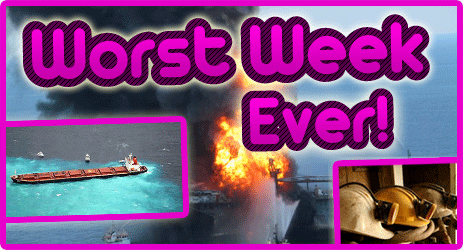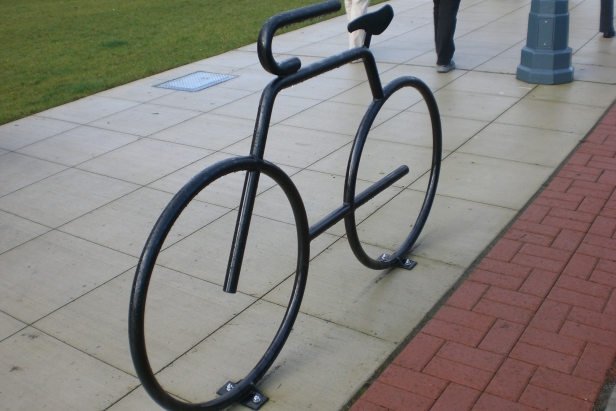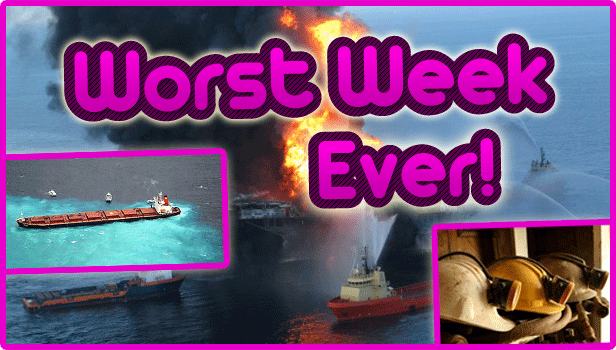 It’s a week to remember — or better yet, forget. Who could have imagined such a confluence of terrible, horrible, no-good, very-bad events, rounding up what has to be the most disheartening “Earth Month” ever?
It’s a week to remember — or better yet, forget. Who could have imagined such a confluence of terrible, horrible, no-good, very-bad events, rounding up what has to be the most disheartening “Earth Month” ever?
- In what may soon be the worst oil spill in U.S. history, crude is gushing into the Gulf of Mexico and bleeding into Louisiana wetlands. The situation is so dire that our best environmental option is to set it ablaze. Eleven workers died when the rig blew up. Economic disaster may follow ecological and human disaster, with the fishing, shrimping, and tourism industries likely to take a body blow. Remember when President Obama called for a major expansion of offshore drilling four weeks ago and said “oil rigs today generally don’t cause spills”? How comforting.
- Two coal miners were crushed to death in Kentucky while working for a company with a long history of endangering its workers. This story should have shocked the nation, but coming in the wake of 29 miner deaths earlier this month and in the shadow of the oil spill, it got barely of blip of attention.
- The Chinese coal freighter that crashed into the Great Barrier Reef a few weeks ago remains stuck and Australian authorities say the best option may be to sink it.
- Even the week’s good news — the Obama administration’s approval of Cape Wind, which would be the nation’s first offshore wind farm — feels pretty bad. While offshore oil drilling proceeds merrily along with bipartisan support, it’s taken nine years of torturous wrangling to get this far with Cape Wind. Environmentalists continue to spar over it, and still more litigation and stalling will follow before a single turbine goes online along a U.S. coastline. “I’m worried about all those wind turbines blowing up & leaving a wind-slick on the coast of Cape Cod,” quipped one climate reporter.
That’s just this week. Looking back at the whole month of April, we had Massey’s Big Branch mine disaster, another coal miner death in West Virginia, an oil refinery explosion in Washington state that killed seven workers, an 18,000-gallon oil spill from a Chevron pipeline into the Louisiana Delta, and, as mentioned above, a big oil spill at the world’s largest continuous coral reef.
The connection running through every one of these disasters, of course, is dirty energy — oil and coal. Only a fool would refuse to see the need to end our addiction.
Speaking of which, the U.S. Senate looks likely to turn its back on the problem for the year. Plans to introduce a climate and energy bill this week — albeit one that’s disturbingly friendly to the fossil-fuel industry — are on the skids because of a spat between Sens. Lindsey Graham (R-S.C.) and Harry Reid (D-Nev.).
Leave it to a business professor to find a “silver lining” in the week’s terrible news: “I think it may create some temporarily spikes in employment if the companies hire some local labor to clean up the spill,” Rajesh Narayanan, professor of finance at Louisiana State University’s business school, told The New York Times.
The craziest part is that our leaders continue pledging their tender loving care not to the natural world but to the GDP.
“Think of the language our politicians use,” author and global organizer Bill McKibben said in a recent conversation. “‘The economy is ailing.’ ‘It’s hit a rough patch.’ Or ‘It’s healing.’ Or ‘showing signs of healing.’ I mean, we talk about it like you would your great aunt. But with the planet, it’s ‘natural cycles’ and ‘pay no attention.’ ‘The Arctic melted: must be a natural cycle someplace.'”
We’re still acting as if the economy is the thing that’s real, the thing with physical weight and force. We’re acting as if the natural world is the abstraction, the intellectual concept that we can adjust to better suit our needs. That confusion will be the root of more disasters.




